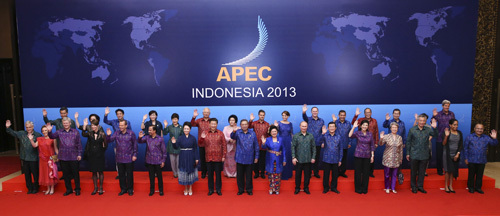|
 |
|
COLORFUL REGION: APEC leaders and their spouses pose for a group photo on October 7 in Bali, Indonesia (MA ZHANCHENG) |
Amid a slow global economic recovery in recent years, the Asia-Pacific region, consisting of the most dynamic and hopeful economies on the globe, has maintained vigorous economic growth.
Under the theme Resilient Asia-Pacific, Engine of Global Growth, this year's series of Asia-Pacific Economic Cooperation (APEC) meetings were held from October 7-8 on the Indonesian resort island of Bali. Chinese President Xi Jinping participated in the APEC informal economic leaders' meeting, equipped with proposals to boost regional economic ties and assertions that China will continue pursuing economic reform.
China's role in APEC
During the meeting, the Chinese president exchanged views with leaders of APEC members. He called on all regional members to further restructure their economies, oppose trade protectionism, and boost cross-Pacific interconnectivity. Xi also proposed that members increase the openness of their economies, as well as promote policy coordination, common development and the integration of interests in the area.
These proposals will help the region handle current challenges and formulate plans for the future, said Chinese Foreign Minister Wang Yi. Wang believes China's active role will help the region continue serving as an engine for world economic growth.
As the biggest developing country and emerging economy in the world, China's economy and its development plans have been a subject of worldwide concern. In an address at the APEC meeting on October 7, Xi warned against a world trade regime fragmented by various competing free trade arrangements, and called for resuming the long-stalled Doha Round of global trade talks by the World Trade Organization (WTO). He also noted that as the international community works to advance the Doha Round, various free trade arrangements in the Asia-Pacific region are advancing in parallel, each with different rules, standards and preferred paths.
China believes that "the arrangement should lead to a cooperative relationship, not a confrontational one; an open mindset, not an exclusive one; win-win results, not a zero-sum game; and integration, not fragmentation," as Xi said, promising that China is willing to provide capital assistance to developing countries in the region for their infrastructure construction projects.
Qu Xing, President of China Institute of International Studies (CIIS), pointed out that the president's promise shows China's full confidence and sincerity behind regional cooperation. By speaking of an Asia-Pacific community with a common destiny and shared values, President Xi's suggestions indicated practical goals for regional cooperation, said Qu. He said that an infrastructure construction investment bank, if established and put into operation, would greatly help make full use of APEC members' extra capital, promote economic development of regional economies, and narrow gaps between them.
Liu Chenyang, a researcher on APEC studies with Tianjin-based Nankai University, said, "Regional cooperation must be based on principles such as voluntariness and common interests." He went on to add that, "China has shown its influence and leadership in the region, not only because of its heightened economic strength, but also because its proposals satisfy most APEC members' growth demands."
The Chinese president also said China will continue deepening its reforms to ensure stable economic growth, stating his full confidence in the vitality of the Chinese economy. "I am confident first and foremost because China's growth rate is within the reasonable and expected range," said Xi, adding that "everything has been going as expected and nothing has come as a surprise."
China's economy recently underwent a slowdown, decreasing from the previous double-digit growth rates to 9.3 percent in 2011, 7.8 last year and 7.6 in the first half of this year. President Xi said such a growth speed is acceptable. An annual speed of 7 percent is enough to realize China's goal of doubling GDP and per-capita income between 2010 and 2020.
Yuan Gangming, a researcher with Tsinghua University, agreed that the slowdown was temporary and noted that the huge potential for increased consumption will likely lead to a higher economic growth rate.
"China is drawing up a master plan for the deepening of reform in all respects," said Xi. He added that challenges cropping up in development and institutional obstacles will be targeted, so as to create new impetus for economic expansion through reform in a balanced manner. To overcome those challenges and obstacles, China will improve its basic economic system, reform the administrative system and enhance innovation, Xi said.
Kuang Xianming, Director of the Research Center for Economy with the China Institute for Reform and Development, said Xi's comments struck a tone for the country's reform and policy making in the coming years. "The robust domestic consumption engines are most important in a country like China, with its huge population," Kuang said. "Xi's speech expressed a determination to push reforms while remaining alert to potential risks," he added.
| 